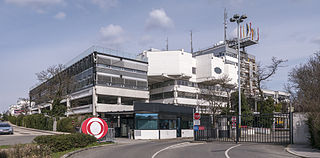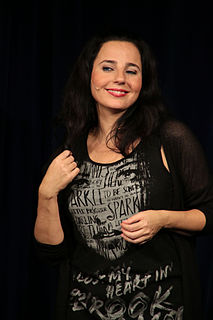A soap opera, or soap for short, is a typically long-running radio or television serial, frequently characterized by melodrama, ensemble casts, and sentimentality. The term "soap opera" originated from radio dramas originally being sponsored by soap manufacturers. The term was preceded by “Horse opera”.

Österreichischer Rundfunk is an Austrian national public broadcaster. Funded from a combination of television licence fee revenue and limited on-air advertising, ORF is the dominant player in the Austrian broadcast media. Austria was the last country in continental Europe after Albania to allow nationwide private television broadcasting, although commercial TV channels from neighbouring Germany have been present in Austria on pay-TV and via terrestrial overspill since the 1980s.

Thomas C. Brezina is an Austrian writer of children's books and TV-Presenter. He is especially known for his series, The Knickerbocker Gang, A Case for You and the Tiger-Team and his stories about the talking bike Tom Turbo, as well as for hosting the children's television series Am Dam Des. He has published over 550 books and his work has been translated into 35 languages.

Peter Alexander Ferdinand Maximilian Neumayer, commonly known as Peter Alexander, was an Austrian actor, singer and one of the most popular entertainers in the German-language world between the 1950s and his retirement. His fame emerged in the 1950s and 1960s through popular film comedies and successful recordings, predominantly of Schlager and operetta repertory. Later, Alexander established himself as the acclaimed host of television shows. His career as a live singer touring the German language countries lasted until 1991, while he continued his television work until 1996.
ORF 1 is an Austrian public television channel owned by ORF. It was the first television channel in Austria, started in 1955.
Austria participated in the Eurovision Song Contest 2005 with the song "Y así" written by Christof Spörk and Edi Köhldorfer. The song was performed by the group Global Kryner. The Austrian broadcaster Österreichischer Rundfunk (ORF) organised the national final Song.Null.Fünf in order to select the Austrian entry for the 2005 contest in Kyiv, Ukraine. Five artists and ten songs competed in a televised show where a public vote consisting of regional televoting and mobile phone voting exclusively selected "Y así" performed by Global Kryner as the winner.

Nick is a German free-to-air television channel, part of the international Nickelodeon brand. Originally launched in 1995, and relaunched in 2005, Nickelodeon is based in Berlin. The channel is available on subscription services and as an unscrambled, free-to-air (FTA) satellite signal. On 31 March 2010, the channel re-adopted the name Nickelodeon on air and online, in addition to the new Nickelodeon logo and graphical package being rolled out internationally at the time. Since then, the channel is also broadcast in English in addition to German on a secondary audio track.

Coming of Age is a British sitcom, written by Tim Dawson, produced in house by BBC Productions, and broadcast on the former channel BBC Three. The show takes a direct look at five sixth form students, Jas, Ollie, Matt, Chloe and DK, as well as, from series three, new character Robyn Crisp, who are living in Abingdon. Their lives rotate around the fictional Wooton College, their bedrooms, and Ollie's garden shed. A pilot originally aired in 2007, followed by the first series in 2008, a second series in 2010, and a third beginning in January 2011. In 2011, the show was cancelled along with other long running BBC Three programmes including Ideal, Two Pints of Lager and a Packet of Crisps, Hotter Than My Daughter, and Doctor Who Confidential. The first series was released on DVD on 26 October 2009, however, no further series have been released on DVD.
ORF 2 is an Austrian public television channel owned by ORF. It was launched on 11 September 1961 as a technical test programme. Today it is one of the four public TV channels in Austria.
The ORF regional studios are branch offices from ORF in each state of Austria. Since 1975 there is also a regional office in and since 2021 a broadcasting TV studio in Bolzano for the German-speaking population of South Tyrol, Italy.

Wiener Film is an Austrian film genre, consisting of a combination of comedy, romance and melodrama in a historical setting, mostly, and typically, the Vienna of the late 19th and early 20th centuries. The Wiener Film genre was in production between the 1920s and the 1950s, with the 1930s as its high period.
A teen situation comedy, or teen sitcom, is a subgenre of comedic television program targeted towards young people. In general, these type of programs focus primarily on characters between 11 and 19 years of age and routinely feature characters involved in humorous situations, and often focus on the characters' family and social lives. The primary plot of each episode often involves the protagonist(s) the program centers on, while secondary plotlines often focus on the character(s') parents, siblings or friends, although the secondary characters may sometimes also or instead be involved in the episode's main plot.

A telenovela is a type of a television serial drama or soap opera produced primarily in Latin America. The word combines tele and novela. Similar drama genres around the world include teleserye (Philippines), téléroman, and sinetron (Indonesia).
Kottan ermittelt is an Austrian television series that was aired by Austrian television ORF between 1976 and 1984. The satirical 19-episode series about a policeman from Vienna now sports cult status. Police major Adolf Kottan was played by three actors who each gave the character a distinct 'flavor'.
Austria participated in the Eurovision Song Contest 2013 with the song "Shine" written by Andreas Grass, Nikola Paryla, Natália Kelly and Alexander Kahr. The song was performed by Natália Kelly. The Austrian broadcaster Österreichischer Rundfunk (ORF) organised the national final Österreich rockt den Song Contest in order to select the Austrian entry for the 2013 contest in Malmö, Sweden. Five songs competed in a televised show where an international jury panel and a public vote selected "Shine" performed by Natália Kelly as the winner.

Nadja Maleh is an Austrian actress, singer, cabaret artist and director.
Austria participated in the Eurovision Song Contest 2003 with the song "Weil der Mensch zählt" written and performed by Alf Poier. The Austrian broadcaster Österreichischer Rundfunk (ORF) organised the national final Song.Null.Drei in order to select the Austrian entry for the 2003 contest in Riga, Latvia. Ten songs competed in a televised show where a public vote split between male and female voters exclusively selected "Weil der Mensch zählt" performed by Alf Poier as the winner.
Television comedy is a category of broadcasting that has been present since the early days of entertainment media. While there are several genres of comedy, some of the first ones aired were variety shows. One of the first United States television programs was the comedy-variety show Texaco Star Theater, which was most prominent in the years that it featured Milton Berle - from 1948 to 1956. The range of television comedy has become broader, with the addition of sitcoms, improvisational comedy, and stand-up comedy, while also adding comedic aspects into other television genres, including drama and news. Television comedy provides opportunities for viewers to relate the content in these shows to society. Some audience members may have similar views about certain comedic aspects of shows, while others will take different perspectives. This also relates to developing new social norms, sometimes acting as the medium that introduces these transitions.
Indus Media Group is a Pakistani company broadcasting a mix of free-to-air news and entertainment channels via satellite.







